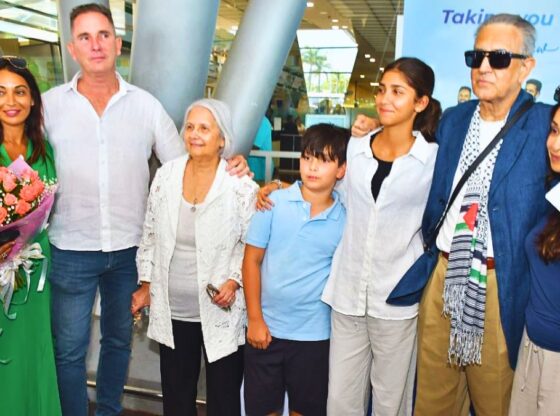Dawood Rawat, a prominent businessman and the former Chairman Emeritus of the defunct British American Investment Group (BAI), made his return to Mauritius on Sunday, December 8, aboard a Turkish Airlines flight.
After nearly a decade away, Rawat arrived to a warm welcome from close friends, family, and supporters who gathered at Plaisance Airport to greet him.
Rawat was a close associate of Prime Minister Navin Ramgoolam during his last tenure and it would seem that after his re-election, the path of his return has been cleared. The previous government had looked into his operations and called him a Ponzi scammer which led to him leaving the country but now that his ally government is back in power, Dawood Rawat is also back in Mauritius.
For those of you who do not know about Rawat, here is a brief background:
Rawat was a distinguished entrepreneurs with a determined spirit. Rawat embarked on surpassing the local ‘traditional private sector’ in Mauritius, eager to extend his influence, he delved into procuring various assets, readily purchasing anything available for sale.
Serving as a beneficiary of his close association with former Prime Minister Navin Ramgoolam, Rawat nonetheless engaged in fair competition across several industries. Although he might have obtained land for establishing a hospital at a nominal cost, he introduced unprecedented medical care standards in Mauritius, compelling his rivals to reassess their strategies. Even his critics found themselves seeking top-quality care at his hospital, evidently not due to political backing. Additionally, he established a distinguished nursing school aimed at training individuals predominantly from the lower echelons of society.
Subsequently, Rawat took on greater risks, establishing a bank when unable to secure a loan. While Bramer Bank initially emerged, signs of instability surfaced. While rumors hinted at a liquidity crisis, there were reportedly no issues related to unsettled insurance claims, outstanding business payments, or depositor withdrawals. Notably, the BAI invested 58% of its capital in its own entities, and despite irregularities, the regulatory authorities turned a blind eye until 2013. Did Rawat overextend himself? Quite possibly.
Nevertheless, the accusation leveled against him didn’t only encompass overreaching. Instead, he was branded as a Ponzi scheme operator, a stark contrast to a daring investor. Overnight, his and his family’s work, along with the livelihoods of 4,000 employees and countless depositors and policyholders, faced a catastrophic collapse. The circumstances surrounding this downfall might one day become the subject of historical scrutiny. Was the crisis orchestrated or hastened by the government’s withdrawal of around Rs1.5 billion, followed by significant withdrawals from government-controlled state-owned enterprises amid ensuing widespread panic? Was the Central Bank’s reluctance to provide a loan a cautious move or politicized? Was the eventual collapse of the BAI an inevitable catastrophe? Furthermore, was Rawat coerced into relinquishing his companies for a symbolic rupee? These critical questions loom unanswered.
Was Rawat a role model or a Ponzi scheme operator? Neither. He was a businessman who navigated the system and reaped the benefits of political favoritism, much like those before him. While he might not have adhered strictly to conventional business practices, he toiled diligently to earn his livelihood. His persona incorporated various shades of grey, evoking a sense of profound sorrow amidst the unfolding events for all involved. The question remains, with the return of Navin Ramgoolam’s government, does Rawat look to gain back those political favours and mark his territory in Mauritius?
